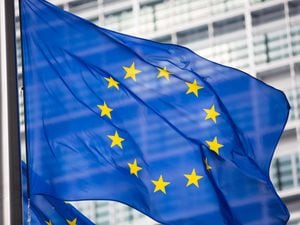Lebanese president asks professor to form government
People have been protesting for over two months, calling for a government made up of specialists.

Lebanon’s president has asked a university professor and a Hezbollah-backed former minister to form a new government, breaking a weeks-long impasse.
Michel Aoun named Hassan Diab as prime minister after a day of consultations with politicians in which he gained a simple majority of the 128-member parliament.
Sixty-nine politicians, including the parliamentary bloc of the Shiite Hezbollah and Amal movements as well as politicians affiliated with Mr Aoun gave him their votes.
Mr Diab, 60, faces the daunting task of forming a government to tackle the country’s worst economic crisis since the 1975-90 civil war.

He also failed to get the support of the country’s major Sunni leaders, including former prime minister Saad Hariri, which will make it difficult for him to form a new government.
Mr Diab arrived at Baabda palace later on Thursday to meet with Mr Aoun who summoned him for the appointment.
It was not immediately clear whether the appointment would satisfy people in the streets who have been protesting for over two months, calling for a government made up of specialists.
In his first public address, Mr Diab said he would work quickly to form a government that represents a wide array of people following consultations with political parties as well as representatives of the protest movement.
He said he is committed to a reform plan and described the current situation as “critical and sensitive” and requiring exceptional efforts and collaboration.

Mr Diab, who served as education minister in 2011, gained attention after caretaker prime minister Mr Hariri withdrew his name from consideration following weeks of haggling and deep divisions between the various factions over naming him again.
Mr Hariri resigned on October 29 in response to unprecedented mass protests against the entire political class while an already dire economic crisis was quickly deteriorating.
Since then, efforts to agree on a new prime minister and the shape of government have kept hitting a dead end.
Mr Hariri, who is aligned with the West and Gulf countries, has insisted he would head a Cabinet made up of specialists to deal with the economic and financial crisis — a key demand of the protest movement — while the Iran-backed Hezbollah, which initially backed him, has demanded a government that includes all major political factions.
On Thursday, Hezbollah said it backed Mr Diab for prime minister.
Mohammed Raad, the spokesman for the group’s parliamentary bloc, said he hoped Mr Diab receives enough votes and for him to “succeed in his national duties”, and vowed to cooperate in tackling the current crisis.
Binding consultations between Mr Aoun and representatives of the 128-member parliament were delayed twice as Lebanon saw some of the worst violence since protests erupted in mid-October.
The clashes have involved security forces and anti-government protesters, as well as supporters of Lebanon’s two main Shiite groups, Hezbollah and Amal.
In Lebanon’s sectarian-based political system, the prime minister has to be from the Sunni Muslim community.





